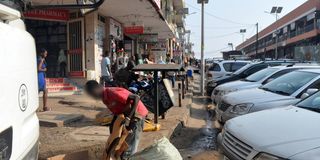Ban on spitting in public deserves attention

A street child collects garbage around shops in Mbarara City recently. Failure to keep one’s premises clean is one of the violations in the proposed Mbarara City Council ordinance. PHOTO | RAJAB MUKOMBOZI
What you need to know:
- The issue: Public order
- Our view: A clean city and one whose populace adhere to common laws can inspire investor confidence. Mbarara City Council should be supported at the national level to see through this vision.
Authorities at Mbarara City Council have drafted a raft of personal and public hygiene laws that, if approved after a wider consultation with the electorate, will see dumping and littering punishable with fines. The highlight of these proposed laws, reported by the Daily Monitor of February 16 titled, “Mbarara moots law to ban public spitting” is the ban on spitting in public.
This is the kind of debate that can attract heated public opinion and indeed it would be right for some to consider it a trivial matter. But in a country choking with plastic waste, any city that stands up to be counted in regulating production, sale, use and disposal of these items that have been a global nuisance in the face of climate change deserve commendation.
Yet there is more to passing an ordinance against public spitting than the attention it is likely to draw. Beyond the obvious health concern related to germs in spittle, a community whose people effectively adhere to such personal hygiene in public is one that will respond well to not only socio-economic programmes of their local authorities but also the government development programmes. It is also welcome that Mbarara City Council has not proposed jail terms in its ordinance – which would be high-handed – but cash fines.
The challenge is on the authorities in Mbarara led by Mayor Robert Kakyebezi to ensure that this ordinance, if approved, works. Across the country, many citizens have lost count of the number of times they have been slapped with flattering policies that then wilt and die. At the other end are a group of persons with vested interests against such policies such as the makers of plastic packing material, or even the attitude of the locals such as in the case of public spitting.
Mbarara has a war on its hand in this. But this is not a war Mbarara must be left to fight alone. Even before the success of it, other city authorities should embrace similar ordinance tied down to other aspects that can contribute to the transformation of their people.
Several reports since Mbarara, alongside Jinja, Arua, Mbale, Masaka, and Gulu became a city in July 2020 have indicated that these are just cities. It is therefore as well that they must strive to make themselves be noticed and attract the necessary investments that can spur socio-economic transformation and thus their status. A clean city and one whose populace adhere to common laws can inspire investor confidence.
Mbarara City Council should be supported at the national level to see through this vision.




